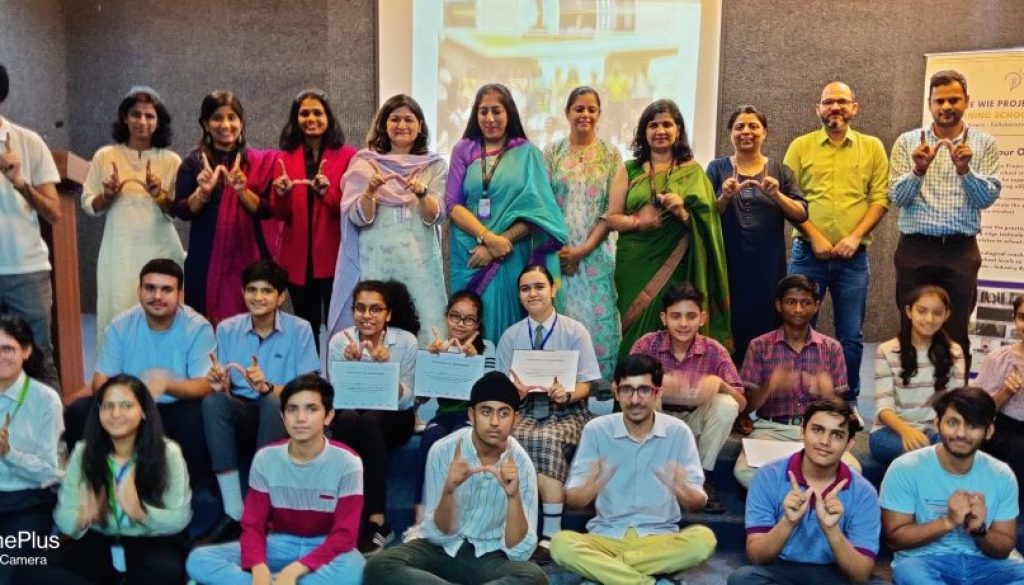𝗜𝗘𝗘𝗘𝗪𝗜𝗘𝗣𝗿𝗼𝗷𝗲𝗰𝘁𝗕𝗮𝘀𝗲𝗱𝗟𝗲𝗮𝗿𝗻𝗶𝗻𝗴𝗦𝗰𝗵𝗼𝗼𝗹𝗖𝗮𝗺𝗽𝟯. (Hybrid Mode)Organized by the Departments of CST & ECE, Manav Rachna University
Pune, Gujarat and other sections ) and partners(IEEE TryEngineering ,STEM Portal, Raspberry Pi
Foundation, Youth for Sustainability, Junior Einstein).
The major goal of this event was to increase the practical use of cutting-edge technologies in school
curriculum, technological reach to elementary and secondary school levels, and to prepare aspiring
students for careers in the industry. There were a good number of participants both online and offline
around 200+ along with teachers and parents. Participants ranged from 8th to 12th grade.
Day #1 started with a welcome speech by Prof.(Dr.) Shruti Vashist , Dean Engineering , Manav Rachna
University. She introduced the audience to the theme of the event which is Sustainability Technology
for Humanity.
Further, there had been inspiring sessions by esteemed speakers including Dr. Ramalatha Marimuthu
,Past WIE Chair ,Globe WIE, Dr. Mini Ulanat , Vice Chair, WIE India Council, Jenifer Castillo, Chair IEEE
WIE Global, Dr. Lenin Raj, Principal Consultant EMC Wireless and Prachi , Founder Cool the Globe along
with numerous section members.
During the Q&A sessions, there was a lot of interaction between students and presenters. It was
incredibly inspiring to witness children’s interest at the school level, which was something that needed
to be addressed through such workshops. A fun exercise was also planned for the students as an ice
breaker session.
Overall, it was a really productive day for all of the participants, who are eager to return the following
day.
Day# 2 was a triumph. We have roughly 200 participants, both online and offline, including instructors
and parents.
The session began with a discussion on STEM applications for humanitarian projects, which students
found very interesting. To make the event more engaging , a quiz was organized on mentimeter.
A workshop was also conducted in which students were exposed to Arduino programming and problem
solving. The workshop was really fascinating and equipped students with new knowledge and skills on
project-based learning.
Altogether, it was a really fruitful day for all of the participants, who are excited to continue making
progress with this camp.
Day#3 to Day#7 witnessed all student teams visiting the campus for the development of the project
though they were supposed to join online.Students received several problem statements for their
projects during the weekly meetings. Projects like Plant health care system, Automatic Water spray,
Ease vision Smart dustbins, smart helmets, etc were showcased. On the last day, students gave
presentations to judges about their work. The judges were taken aback by the students’ excitement at
the school level and their excellent ability to present solutions to their individual problem statements.
The valediction ceremony of this wonderful event was organized on the the final Day#8. We have
roughly 200 plus participants, both online and offline, including instructors and parents. Emeritus
Professor Chun Che Lance Fung, IEEE Australia Council was the keynote speaker of the session who
highlighted the relevance of sustainable technology and congratulated the students for their wonderful
participation
Results were announced following the presentation round, and each student received a reward for their
outstanding effort.
All participants commented favorably on the experience, and we received extremely good feedback
from students, instructors, judges, and parents.
Overall, this camp was successful in stimulating students’ thoughts for the future.
In the end it is right to say that “Productivity is never an accident. It is always the result of a
commitment to excellence, intelligent planning, and focused effort.” – Paul J. Meyer


